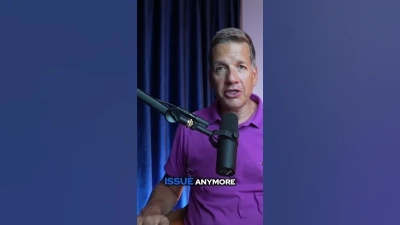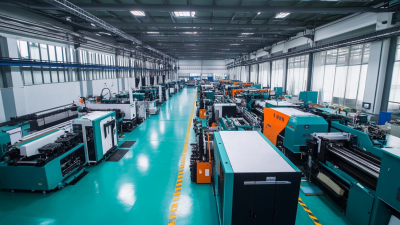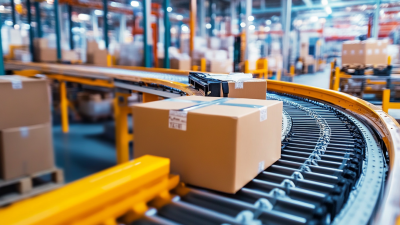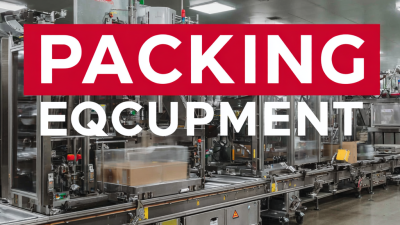ProMach is your partner from start to finish. Our product brands are grouped into distinct business lines that make the most sense to our customers, covering every function of the production line: Filling, Bottling & Capping, Decorative Labeling, Flexibles & Trays, Pharma, Handling & Sterilizing, Labeling & Coding, Robotics & End of Line, and Systems & Integration.
learn moreInnovative Form Fill Seal Examples Transforming Packaging Solutions
The packaging industry is undergoing a significant transformation, driven by the innovative applications of Form Fill Seal (FFS) technology. As revealed in a recent Market Research Report, the global packaging machinery market is projected to reach $48 billion by 2027, with FFS solutions playing a crucial role in this growth due to their efficiency and cost-effectiveness. Companies are increasingly adopting FFS systems to enhance productivity, minimize waste, and ensure product safety, meeting the rising demand for sustainable packaging solutions.
 Moreover, the versatility of FFS technology allows for the packaging of various products—from liquids to solids—making it a preferred choice across multiple sectors including food and beverages, pharmaceuticals, and personal care. As the industry embraces these advancements, it is clear that innovative Form Fill Seal examples are not just transforming packaging solutions but are also setting new standards for operational excellence in the marketplace.
Moreover, the versatility of FFS technology allows for the packaging of various products—from liquids to solids—making it a preferred choice across multiple sectors including food and beverages, pharmaceuticals, and personal care. As the industry embraces these advancements, it is clear that innovative Form Fill Seal examples are not just transforming packaging solutions but are also setting new standards for operational excellence in the marketplace.
Revolutionizing Convenience: The Evolution of Form Fill Seal Technology
Form fill seal technology has undergone remarkable evolution, streamlining packaging processes and enhancing consumer convenience. This method efficiently combines the steps of forming, filling, and sealing into a single operation, minimizing labor costs and reducing the likelihood of packaging errors. As a result, manufacturers can deliver fresher products while maintaining the highest standards of quality. Innovations in materials and machinery have also paved the way for more sustainable practices, using eco-friendly films that contribute to reduced environmental impact.
Recent advancements in this field have allowed for a diverse array of applications across various industries. From single-serve portions to bulk packaging, form fill seal technologies are adaptable to the specific needs of food, pharmaceuticals, and personal care products. Enhanced automation and smart technology integration not only improve efficiency but also offer real-time data analysis for optimizing operations. This convergence of technology and packaging is revolutionizing convenience, ensuring that products remain intact and easily accessible for consumers, while simultaneously meeting the dynamic demands of the market.
Sustainability in Packaging: Eco-Friendly Innovations with Form Fill Seal Systems
The packaging industry is at a pivotal moment, where sustainability and innovation must go hand in hand. Form fill seal (FFS) systems have emerged as a key player in driving eco-friendly practices. By automating the packaging process, FFS technology reduces waste and energy consumption significantly compared to traditional methods. This streamlined approach not only enhances efficiency but also aligns with the growing demand for environmentally responsible solutions in packaging.
Recent advancements in FFS technology highlight the industry's commitment to sustainability. Manufacturers are now using biodegradable and recyclable materials in their packaging, which can be seamlessly integrated into existing FFS systems. Innovative designs, such as minimalistic packaging that uses less material, further contribute to reducing environmental impact. Brands embracing these eco-friendly practices demonstrate that it is possible to maintain product integrity while also caring for the planet, inspiring others in the industry to follow suit in their quest for greener packaging solutions.
Innovative Form Fill Seal Examples Transforming Packaging Solutions
| Packaging Type | Material Used | Sustainability Features | Benefits | Application |
|---|---|---|---|---|
| Flexible Pouches | Biodegradable Films | Home Compostable | Reduced Carbon Footprint | Food Packaging |
| Stand-Up Pouches | Recyclable PET | Post-Consumer Recycled Content | Lightweight and Space-Efficient | Snack Foods |
| Liquid Cartons | Plant-Based Plastic | Biobased Raw Materials | Lower Environmental Impact | Beverages |
| Wraps and Films | PLA (Polylactic Acid) | Solvent-Free Adhesives | Non-Toxic | Fresh Produce |
| Tetra Pak | Recycled Board and Plastic | Sustainable Sourcing | Reduced Waste | Dairy and Juice |
Customization and Flexibility: Tailoring Packaging Solutions with Advanced FFS Techniques
As the packaging industry continues to evolve, the demand for customization and flexibility in packaging solutions has surged. Advanced Form Fill Seal (FFS) techniques are at the forefront of this transformation, enabling manufacturers to tailor their packaging according to specific product needs and consumer preferences. According to a report by Smithers Pira, the global flexible packaging market is expected to reach $248 billion by 2025, driven by innovations that allow for more personalized packaging solutions.
A standout example of FFS innovation is the ability to produce smaller, more intricate package sizes that cater to niche markets. The merging of technology with packaging design not only enhances product visibility but also contributes to sustainability efforts. A study by Freedonia Group notes that 50% of consumers prefer brands that incorporate eco-friendly packaging, leading companies to adopt biodegradable materials within their FFS systems. This adaptability not only meets consumer demand but positions brands as forward-thinking entities in a competitive market.
Moreover, the implementation of smart technology with FFS processes is paving the way for real-time customization. For instance, the integration of digital printing with FFS machines allows brands to create limited-edition packaging runs, appealing to collectors and enhancing user engagement. This shift towards agile production aligns with recent trends indicating that personalized packaging can drive sales by up to 20%. As FFS techniques advance, the potential for unique and flexible packaging solutions continues to expand, setting new standards for the industry.
Innovative Form Fill Seal Solutions in Packaging
This chart illustrates the growing importance of customization and flexibility in packaging solutions using Advanced Form Fill Seal (FFS) techniques across different industries. The data reflects the percentage of companies adopting these technologies in various sectors, showcasing the trend towards tailored packaging.
Smart Packaging Solutions: Integrating Technology into Form Fill Seal Processes
 The integration of technology in form fill seal (FFS) processes is revolutionizing the packaging industry, paving the way for smarter, more efficient solutions. According to a report by Smithers Pira, the global market for smart packaging technologies is projected to reach $38 billion by 2027, driven by increased consumer demand for interactive and safe packaging options. Advanced FFS machines now incorporate features like IoT connectivity, allowing real-time monitoring and data collection for optimized production efficiency and reduced waste.
The integration of technology in form fill seal (FFS) processes is revolutionizing the packaging industry, paving the way for smarter, more efficient solutions. According to a report by Smithers Pira, the global market for smart packaging technologies is projected to reach $38 billion by 2027, driven by increased consumer demand for interactive and safe packaging options. Advanced FFS machines now incorporate features like IoT connectivity, allowing real-time monitoring and data collection for optimized production efficiency and reduced waste.
Furthermore, the evolution of materials in FFS technology is enhancing product shelf life and sustainability. A recent study from the Packaging Association indicates that using biodegradable and compostable materials in FFS packaging can reduce environmental impact by up to 30%. Innovations such as smart labels equipped with QR codes and NFC technology enable brands to connect with consumers, providing valuable information about product sourcing and freshness. As these technologies develop, packaging solutions not only become more user-friendly but also play a crucial role in delivering transparency and sustainability in the supply chain.
Future Trends: What’s Next for Form Fill Seal in the Packaging Industry
As we look ahead, the form fill seal (FFS) technology in the packaging industry is set to undergo significant transformations driven by advancements in automation and sustainability. According to a recent report by Smithers Pira, the global FFS packaging market is expected to grow at a CAGR of 6.8% between 2021 and 2026, indicating a rising demand for efficient, cost-effective packaging solutions. This growth can be attributed to the increasing need for fast-paced production in sectors like food and beverage, pharmaceuticals, and personal care, where speed and precision are essential.

One of the most pivotal trends is the integration of smart technology within FFS systems. Companies are adopting IoT-enabled machines that provide real-time data analytics to enhance operational efficiency. Research by Mordor Intelligence highlights that by 2025, the use of such intelligent systems could reduce production downtimes by up to 30%. Additionally, the focus on sustainability is prompting manufacturers to innovate with biodegradable and recyclable materials, thereby catering to eco-conscious consumers while complying with stringent environmental regulations. This dual emphasis on efficiency and sustainability positions FFS technology as a catalyst for change in the packaging landscape.
Related Posts
-

Exploring Sustainable Packaging Equipment Alternatives for Modern Businesses
-

Exploring Diverse Packaging Solutions: How to Choose the Right Fit for Your Global Procurement Needs
-

Future of Packing Equipment: 2025 Innovations and How to Optimize Your Supply Chain
-

Top 10 Case Packing Equipment Manufacturers from China at the 137th Canton Fair
-

Ultimate Guide to Choosing the Best Packaging Equipment: Insights and Data for Optimal Efficiency
-

Innovative Examples of Best Packing Equipment for Global Buyers